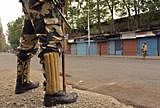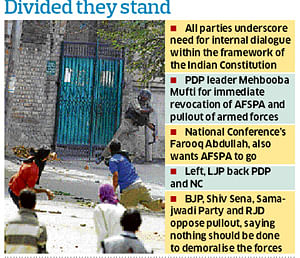

But the meeting decided on sending a delegation of political leaders to the region where continuing violence claimed five lives in police firing on Wednesday.
Police and security forces opened fire on demonstrators protesting against the alleged sacrilege of the holy Quran in the US, in the Mendhar in Pooch of Jammu region. Four students were killed and 25 others injured. Police claimed that the men in uniform resorted to firing when the protesters tried to set ablaze a Christian missionary school. One person was killed at Sopore in Kashmir.
The UPA government’s move to call an all-party meeting to discuss the controversial Armed Forces Special Powers Act (AFSPA) followed an especially lethal outburst of violence since Id-ul-Fitr and a day later when 19 civilians were killed in police firing and nearly 100 injured in the ensuing mayhem.
Indicative of the government’s approach which has not helped in containing the three-month-long violent phase in the Valley was Prime Minister Manmohan Singh’s opening remarks at the meeting, seeking dialogue and appealing to Kashmiris to abjure violence so that talks could proceed.
This has been the government’s patent stand on the Kashmir issue, but the failure on the part of the leaders, who took part in the five-hour meeting at the prime minister’s residence, to reach a consensus on the AFSPA indicated that the Centre’s decision to have a wider discussion on the controversial legislation was designed to not take a decision on the matter. The reiteration that the dialogue process was the only means to achieve peace in Kashmir was an indication that the AFSPA would continue to be operational in the Valley.
Interestingly, neither the prime minister’s remarks nor UPA chairperson Sonia Gandhi’s speech made any reference to the act. Singh, however, made it clear that some groups were “orchestrating” violence in the Valley.
At the end of the meeting, it was decided that Home Minister P Chidambaram will lead an all-party delegation to Kashmir to gather all shades of opinion from the Valley. “Leaders of various political parties who attended Wednesday’s meeting agreed that the Constitution of India provides ample scope to accommodate any legitimate political demand through dialogue, civil discourse and peaceful negotiations,” a statement said.
Pointing out that the leaders “will meet all sections of the people and gather all shades of opinion,” the statement said: “The feedback received from the all-party delegation would form an important input into the government’s evolving response on various issues relating to Jammu and Kashmir.”
Divergent views
The meeting saw strong, divergent views being expressed over the AFSPA. While J&K People’s Democratic Party leader Mehbooba Mufti demanded revocation of the act and withdrawal of the Army from the state, the National Conference, which rules Jammu and Kashmir along with the Congress, was for partial withdrawal.
BJP president Nitin Gadhkari was against any dilution in the AFSPA but said his party would support any dialogue “within the framework of the Constitution.” The Left parties and the Lokshakti Janata Party supported revocation of the AFSPA but the Shiv Sena, Samajwadi Party and Rashtriya Janata Dal opposed any such move, saying nothing should be done to demoralise the forces. Mufti was in favour of involving the separatist groups in the talks.
State Chief Minister Omar Abdullah did not attend the meeting but the National Conference (NC) was represented by his father and Union Minister Farooq Abdullah who did not speak at the meeting. While the BJP and the PDP came down heavily on the nearly two-year rule of the NC-Congress government, the senior Abdullah claimed that the prime minister praised governance in the state.
Most parties, led by Nationalist Congress Party leader and Union Agriculture Minister Sharad Pawar and Mufti and backed by Left parties, made a strong demand for the immediate release of youths arrested over the last few months. Mufti also demanded lifting of curfew and narrated how life had become difficult in the strife-torn Valley.
Although BJP veteran L K Advani along with party colleagues Sushma Swaraj and Arun Jaitely attended the meeting, it was party chief Nitin Gadkari who spoke. Union ministers Pranab Mukherjee, A K Antony and S M Krishna were part of the meeting but did not speak while Chidambaram read out the statement at the end of the meeting.